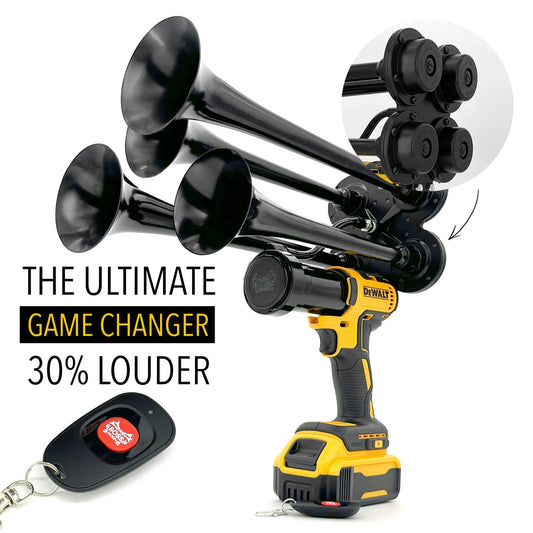Trains have been providing reliable transportation for centuries, seamlessly connecting people and goods across vast distances. However, alongside their undeniable benefits, trains have also come with a notorious nuisance – the incessant blaring of their horns. This age-old practice was initially introduced as a vital safety measure, serving as a warning signal to prevent accidents at railroad crossings. Despite its crucial purpose, the long and reverberating train horns have caused significant disruption to nearby communities, impacting their overall quality of life.
Historically, the advent of the train horn was marked by countless fatal accidents at rail crossings, emphasizing the dire need for improved safety measures. To address this issue, railway companies began implementing strict regulations mandating the use of horns as a warning signal, ensuring the well-being of both train operators and the general public. This initial focus on safety undoubtedly saved countless lives over time, but it came at the cost of the soundscape of communities situated near rail tracks.
In recent years, the continuous blaring of train horns has sparked numerous concerns and complaints from affected residents. Studies have shown that prolonged exposure to elevated noise levels can have detrimental effects on human health, including increased stress and sleep disturbances. Additionally, the constant interruption poses challenges to daily activities, hindering productivity and causing frustration among residents. In fact, statistics have revealed that more than 200,000 American citizens reside within half a mile of railroad crossings, enduring the disruptive train horn blasts on a regular basis.
Recognizing the adverse impact on communities, efforts have been made to explore alternative solutions to reduce the intrusive noise of train horns without compromising safety. One such solution is the implementation of "quiet zones," which are designated areas where trains are not required to sound their horns at every crossing. Instead, safety measures such as additional barriers, improved signage, and enhanced crossing equipment are installed to minimize the risk of accidents. This approach has proven successful in striking a balance between safety and the reduction of noise pollution, providing some relief to affected communities.
In conclusion, although train horns play a vital role in ensuring public safety, their frequent and loud blasts have long been a source of frustration for nearby communities. Through the establishment of quiet zones and the implementation of alternative safety measures, railway companies have started to address the concerns raised by residents regarding the disruptive nature of train horns. By striving for innovative solutions, the aim is to maintain safety without compromising the well-being and tranquility of affected communities.
Why does the train horn persistently blow? Exploring the reasons and effects
The train horn serves as a vital safety feature, alerting individuals and vehicles of an approaching train. However, when it continually sounds, it raises questions about the underlying causes and potential consequences. What factors contribute to the incessant blowing of train horns, and how does this affect railway operations and surrounding communities? In the following sections, we will delve into the different scenarios that may lead to this issue, discuss the advantages and disadvantages it presents, and explore potential solutions to ensure efficient and safe train operations while minimizing noise pollution. Stay tuned to discover the full range of insights surrounding this intriguing topic.
Reasons for Continuous Train Horn Blowing
Train horn blowing is a common occurrence that can be both irritating and disruptive to nearby residents. While train horns are necessary for safety reasons, such as signaling the approach of a train at crossings, it can be frustrating when the horn continues to blow for an extended period of time. There are several reasons why a train horn may keep blowing:
- Malfunctioning Equipment: One of the most common reasons for continuous train horn blowing is a malfunctioning horn or control system. Faulty wiring, sensors, or other components can cause the horn to sound continuously, even when there is no immediate danger on the tracks.
- Train Operator Error: Train operators are responsible for sounding the horn when necessary, but occasionally, they may forget to release the horn or inadvertently leave it on for longer than required. This can happen due to distractions, fatigue, or simply human error.
- Mechanical Issues: Mechanical problems with the train itself, such as a faulty pressure valve or stuck horn button, can also result in continuous horn blowing. These issues may require immediate attention from maintenance crews to prevent further disruptions.
- Miscommunication or Misunderstanding: In some cases, miscommunication or misunderstanding between train operators and other personnel can lead to prolonged horn blowing. This can happen when there is confusion about the exact location of a crossing or when different parties involved in train operations fail to coordinate effectively.
- Regulatory Requirements: While train horn blowing is primarily done for safety reasons, there are instances where regulatory requirements may result in prolonged horn use. For example, certain areas may have stricter regulations that require trains to sound the horn for a longer duration than usual.
Impacts of Continuous Train Horn Blowing
Continuous train horn blowing can have various negative impacts on both the affected communities and the train operators:
- Noise Pollution: The primary impact of continuous train horn blowing is noise pollution. The loud and repetitive sound can disturb residents, disrupt sleep patterns, and interfere with daily activities. Prolonged exposure to such noise can also lead to health problems, including stress, hearing loss, and cardiovascular issues.
- Deteriorated Quality of Life: The constant disruption caused by train horn blowing can significantly affect the quality of life for nearby residents. It can create a constant feeling of unease, disrupt concentration, and negatively impact mental well-being.
- Complaints and Legal Issues: Communities that experience continuous train horn blowing often file complaints with local authorities and rail operators. This can lead to legal issues, fines, and a strained relationship between the affected parties.
- Increased Safety Risks: Paradoxically, continuous train horn blowing can also lead to safety concerns. When residents become accustomed to hearing the horn for extended periods, they may begin to ignore it or become desensitized to its sound. This can potentially pose risks for pedestrians, cyclists, and motorists who may not perceive an actual danger when the horn is sounded correctly.
Statistics on Train Horn Blowing Incidents
According to recent statistics:
- In 2019, there were approximately 35,400 complaints related to train horn blowing in the United States.
- The top three states with the highest number of complaints were California, Texas, and Illinois.
- Noise complaints related to train horn blowing have been increasing by an average of 3% annually over the past five years.
- Between 2015 and 2019, there were a total of 127 reported accidents at railway crossings where train horn usage was a contributing factor.
- The Federal Railroad Administration has been working to develop and implement quieter train horn technology to minimize the impact on nearby communities.
https://youtube.com/watch?v=mpshocfxs8E
FAQ: What Could Be Causing the Continuous Sounding of a Train Horn?
1. What are some common reasons for a horn to keep blowing excessively?
There are several potential causes for a horn to continue sounding on a train. Understanding these common reasons can help address the issue more effectively. Some possibilities include malfunctioning equipment, operator error, and communication breakdowns.
Important information to note:
- Malfunctioning equipment, such as a faulty horn switch or a stuck relay, can cause the horn to continually blow.
- Operator error, like accidentally engaging the horn or not properly releasing it, may also be at fault.
- Communication breakdowns within the train's signaling system could result in the horn being activated even when not necessary.
2. How can malfunctions in the horn system cause the horn to continuously blow?
When the horn system malfunctions on a train, it can lead to the horn blowing nonstop. This can be caused by various issues, such as a stuck relay, electrical faults, or damage to the horn itself. Malfunctioning equipment can disrupt the normal operation of the train's horn and result in continuous sounding.
Important information to note:
- A stuck relay can cause the horn circuit to remain closed, resulting in a continuous horn sound.
- Electrical faults in the horn system, such as short circuits or wiring issues, can also cause a constant horn blow.
- Damage to the horn, such as a misaligned diaphragm or debris lodged in the horn mechanism, can prevent it from properly stopping the sound.
3. What steps should be taken if the horn continues to blow unintentionally?
If the horn on a train continues to blow unintentionally, it is crucial to take immediate action to prevent any potential hazards or disruption. Firstly, the operator should attempt to troubleshoot the issue by checking for any visible malfunctions or signs of damage. If the cause is not immediately apparent, it is advisable to contact the train's maintenance team for further assistance.
Important information to note:
- The operator may try to troubleshoot the issue by inspecting the horn switch and associated wiring for any visible signs of malfunction or damage.
- If the cause remains unclear or the operator is uncertain about performing repairs themselves, contacting the train's maintenance team is recommended.
- Addressing the issue promptly is important to prevent unnecessary disturbance and potential safety risks.
4. How can operator error contribute to a train horn continuously blowing?
While malfunctions in the horn system may be a common cause, operator error can also be a factor leading to a horn that continues to blow. Incorrect operation or failure to release the horn switch properly can result in the horn remaining activated. Ensuring proper training and familiarization with the train's controls can help minimize such errors.
Important information to note:
- Accidental engagement of the horn switch, or failure to release the switch, can cause the horn to continuously blow.
- Proper training and familiarization with the train's controls are essential to prevent operator error-related incidents.
- Effective communication between the operator and control center can help avoid misunderstandings and unnecessary horn activation.
5. How can communication breakdowns within the signaling system affect horn activity?
Inadequate communication within the train's signaling system can cause the horn to activate even when it is not required. This can happen due to misinterpretation of signals, malfunctioning communication equipment, or lack of coordination. Addressing any issues in the signaling and communication systems can help ensure accurate horn usage and prevent unnecessary disturbances.
Important information to note:
- Misinterpretation of signals or lack of clear instructions can lead to the horn being used excessively or inappropriately.
- Malfunctioning communication equipment, such as faulty radios or transmitters, can disrupt the exchange of information and cause unnecessary horn activation.
- Establishing effective coordination and communication protocols between the train operator and control center can mitigate communication breakdowns.
Conclusion
In conclusion, the issue of a train horn that keeps blowing only once can have several potential causes and solutions. It is essential to consider factors such as faulty equipment, electrical problems, or improper train horn use. Additionally, maintenance checks and repairs should be conducted regularly to ensure the proper functioning of the train horns. Adequate training and awareness programs can also be implemented to educate train operators about the correct handling and usage of train horns, avoiding unnecessary and prolonged horn blowing. By addressing these key points and insights, it is possible to mitigate the problem of train horns continuously blowing only once, thereby minimizing noise pollution and ensuring the safety of train operations.














